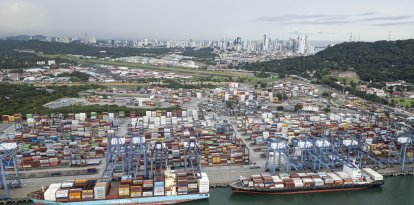Venezuelans swap the US for Spain in their emigration intentions
Venezuelan sociologist Tomás Páez told VOZ that at least 69% of Venezuelan immigrants have a family member or friend who plans to emigrate.

Venezuelan migrants
Venezuelans have increasingly turned to the United States as their destination for emigration, a trend that coincides with the secure border policies advocated by President Donald Trump.
A study by Poder & Estrategia reveals that Spain, Brazil, and Colombia have become the top destinations for Venezuelans to emigrate, following a significant decline in the United States' appeal—dropping from 27% to 11%.
The study, which surveyed 1,040 Venezuelans, found that the intention to move to Spain rose from 18% to 26%, while Brazil increased from 11% to 16%. Colombia's share remained steady at 13% in recent months.
Other options include Chile and Argentina.
Between January and March, the intention to migrate among Venezuelans increased by 2.8 percentage points, rising from 43.7% to 46.5%. This data comes from the Venezuelan Social Report, conducted by the consulting firm Datos es Noticia and obtained by El Tiempo from Colombia.
The new wave of Venezuelans intending to migrate could break records, with an estimated 4.7 million people expected to leave the country before October this year. This would represent approximately 700,000 more than those who fled during the migratory peak between 2018 and 2019, under the first presidency of Donald Trump.
Tomás Páez Bravo, sociologist and president of the Venezuelan Diaspora Observatory, explained in an interview with VOZ that as long as Nicolás Maduro's socialist regime remains in power, Venezuelans will continue to emigrate.
Trump is tough on illegal immigration
69% of Venezuelan immigrants have a family member or friend who intends to emigrate
The sociologist argued that the primary reason for emigration is the humanitarian crisis and the lack of basic services. According to local media, including El Nacional, another key factor driving Venezuelans to leave is political, fueled by institutional disillusionment and the failure of democratic mechanisms in the country.
Páez Bravo explained that at least 69% of Venezuelans abroad reported having a relative or friend who intends to emigrate from Venezuela.
In this regard, he explained that while the focus is currently on Venezuelans who have emigrated to the United States, they actually represent only 12% of Venezuelan immigrants worldwide.
A greater migratory movement in the region
Therefore, he explained, the countries that will experience the greatest movement of Venezuelan migrants are the neighboring nations. For instance, he noted that in the second half of last year, the number of Venezuelans crossing from Pacaraima to Boa Vista increased fivefold.
He also pointed out that there is data that is rarely mentioned. This includes the number of Venezuelans emigrating to Guyana, which he considers to be the fastest-growing economy in South America.
He emphasized that the primary reason Venezuelans emigrate is the situation within the country. He argued that living conditions have not improved in Venezuela, citing as an example that the salary of a full professor at the country’s most important university (UCV) is around $12 per month.
"The situation of the country has not only not improved but it is not easy to get gasoline, the electric service in certain regions of the country fails several hours a day, the health sector is in the subsoil and the salary is not extreme poverty, but the following," Paez said.
He also stated that Venezuelan migration has demonstrated successful integration into host countries. He emphasized that, in his view, a population that has contributed to the economic growth of the nations that receive them should not be stigmatized.


























